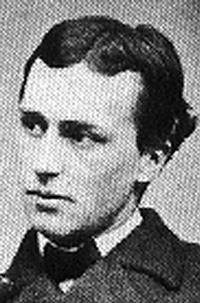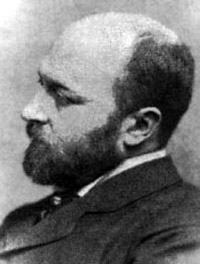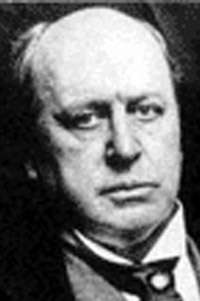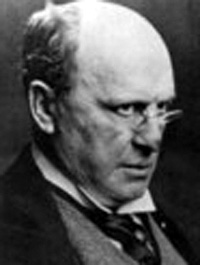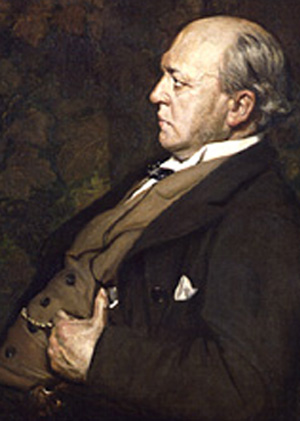Copyright Michael D. Robbins 2005
Astro-Rayological
Interpretation & Charts
Quotes
Biography
Images and Physiognomic Interpretation
“The American knows that a good deal remains,” added James, “what it is that remains—that is his secret, his joke, as one may say.” Nearly thirty-five years later, in a letter (April 1, 1913) to his sister-in-law, James wrote, “Dearest Alice, I could come back to America (could be carried on a stretcher) to die—but never, never to live.”
I hate American simplicity. I glory in the piling up of complications of every sort. If I could pronounce the name James in any different or more elaborate way I should be in favour of doing it.
We work in the dark—we do what we can—we give what we have. Our doubt is our passion and our passion is our task. The rest is the madness of art.
I mourn the safe and motherly old middle-class queen, who held the nation warm under the fold of her big, hideous Scotch-plaid shawl and whose duration had been so extraordinarily convenient and beneficent. I felt her death much more than I should have expected; she was a sustaining symbol—and the wild waters are upon us now.
(Saturn in Capricorn square Sun.)"It takes a great deal of history to produce a little literature.
"Three things in human life are important. The first is to be kind. The second is to be kind. The third is to be kind.
(Venus in Pisces.)"I don't want everyone to like me; I should think less of myself if some people did.
"To take what there "is", and use it, without waiting forever in vain for the preconceived — to dig deep into the actual and get something out of that — this doubtless is the right way to live.
(Moon in Scorpio. / Saturn in Capricorn in 5th house.)"True happiness, we are told, consists in getting out of one's self, but the point is not only to get out — you must stay out; and to stay out you must have some absorbing errand.
Experience is never limited, and it is never complete; it is an immense sensibility, a kind of huge spider-web of the finest silken threads suspended in the chamber of consciousness, and catching every air-borne particle in its tissue."
It is, I think, an indisputable fact that Americans are, as Americans, the most self-conscious people in the world, and the most addicted to the belief that the other nations are in a conspiracy to under-value them.
Live all you can - it's a mistake not to. It doesn't so much matter what you do in particular, so long as you have your life. If you haven't had that, what have you had?
Do not mind anything that anyone tells you about anyone else. Judge everyone and everything for yourself.
(Virgo Ascendant.)It is art that makes life, makes interest, makes importance and I know of no substitute whatever for the force and beauty of its process.
Of course you're always at liberty to judge the critic. Judge people as critics, however, and you'll condemn them all!
To criticize is to appreciate, to appropriate, to take intellectual possession, to establish in fine a relation with the criticized thing and to make it one's own.
In art economy is always beauty.
(Mercury in Aries conjunct Pluto.)Deep experience is never peaceful.
(Scorpio Moon.)The power to guess the unseen from the seen, to trace the implications of things, to judge the whole piece by the pattern, the condition of feeling life in general so completely that you are well on your way to knowing any particular corner of it --this cluster of gifts may almost be said to constitute experience. (Venus in Pisces.)
"It's time to start living the life you've imagined."
"There are moods in which one feels the impulse to enter a tacit protest against too gross an appetite for pure aesthetics in this starving and sinning world. One turns half away, musingly, from certain beautiful useless things."
I adore adverbs; they are the only qualifications I really much respect.
I hold any writer sufficiently justified who is himself in love with his theme.
I think I don't regret a single 'excess' of my responsive youth-I only regret, in my chilled age, certain occasions and possibilities I didn't embrace.
(Aries Sun.)
I've always been interested in people, but I've never liked them.
(Scorpio Moon!)
"Portrait of Henry James" (1913) by John Singer SargentHenry James, OM (April 15, 1843 - February 28, 1916), son of Henry James Sr. and younger brother of the philosopher and psychologist William James, was an American author (although he spent much time in Europe and became a British citizen near the end of his life) and critic of the late 19th and early 20th century, known for novels and novellas based upon themes of consciousness.
As a writer James is generally held to be one of the great figures of trans-Atlantic literature. His works are frequently based on the juxtaposition of characters from different worlds -- the Old World, simultaneously artistic, corrupting, and alluring; and the New World, where people are often brash, open, and assertive.
He favored internal, psychological drama, and his work is frequently about alienation. His earlier work is considered Realist, but in fact throughout his long career he maintained a strong interest in a variety of artistic effects and movements. In the late 20th century, many of James's novels were filmed by the team of Ismail Merchant & James Ivory, and this period saw a small resurgence of interest in his works. Among the best known of these are the short works Daisy Miller, Washington Square, and The Turn of the Screw, and the novels The Portrait of a Lady, The Golden Bowl, The Ambassadors, and The American.
James's middle to late prose style is frequently marked by long, digressive sentences and highly descriptive passages that defer the verb for a longer space than is usual. James's style seems to change during his career from a straightforward style early on and a more languid style later, and biographers have noted that the change of style occurred at approximately the time that James began employing an amanuensis.
Henry James was afflicted with a mild stutter. He overcame this by cultivating the habit of speaking very slowly and deliberately. Since he believed that good writing should resemble the conversation of an intelligent man, the process of dictating his works may, perhaps, account for a shift in style from direct to conversational sentences. The resulting prose style is at times baroque. (His friend Edith Wharton, who admired him greatly, admitted that there were some passages in his works which were all but incomprehensible.) His short fiction (such as The Aspern Papers and The Turn of the Screw) is often considered to be more readable than the longer novels, and early works tend to be more accessible than later ones. It should be noted that The Turn of the Screw is itself one of James' later works. Broad brush comments about the "accessibility" of James' fiction are suspect, at best. Many of his later short stories, for instance, are briefer and more straightforward in style than some tales of his earlier years.
For much of his life he was an expatriate, an outsider, living in Europe. Much of The Portrait of a Lady was written while he lived in Venice, a city whose beauty he found distracting; he was better pleased with the small town of Rye in England. This feeling of being an American in Europe came through as a recurring theme in his books, which contrasted American innocence (or a lack of sophistication) with European sophistication (or decadence) — see for example The Portrait of a Lady or The Golden Bowl.
He made only a modest living from his books, yet was often the houseguest of the wealthy. While not really one of them, James had grown up in a wealthy family and was able to observe them at close range and to sympathize with their problems. (He said he got some of his best story ideas from dinner table gossip.) He was a man whose sexuality was indefinite and whose tastes and interests were, according to the prevailing standards of Victorian Anglo-American culture, rather feminine. It is often asserted that James's being a permanent outsider in so many ways may have helped him in his detailed psychological analysis of situations — one of the strongest features of his writing. He was never a full member of any camp. (See The Bostonians, especially Verena's speech about always looking at the world from behind a sheet of glass.)
The analytical strain in his work is quite strong. It is possible to see many of his stories as psychological thought-experiments. The Portrait of a Lady may be an experiment to see what happens when an idealistic young woman suddenly becomes very rich; alternatively, it has been suggested that the storyline was inspired by Charles Darwin's theory of sexual selection. The novella The Turn of the Screw is a ghost story that deals with the psychological impact on an unmarried (and possibly sexually repressed) young governess who stumbles into an ongoing tragic love affair complicated by the fact that the lovers are dead.
Beyond his fiction, James was one of the more important literary critics in the history of the novel. In his classic essay The Art of Fiction, he argued against rigid proscriptions on the novelist's choice of subject and method of treatment. He maintained that the widest possible freedom in content and approach would help ensure narrative fiction's continued vitality. James wrote many valuable critical articles on other novelists; typical is his insightful book-length study of his American predecessor Nathaniel Hawthorne. When he assembled the New York Edition of his fiction in his final years, James wrote a series of prefaces that subjected his own work to the same searching, occasionally harsh criticism.
For most of his life James harbored ambitions for success as a playwright. He converted his novel The American into a play that enjoyed modest returns in the early 1890s. In all he wrote about a dozen plays, most of which went unproduced. His costume drama Guy Domville failed disastrously on its opening night in 1895. James then largely abandoned his efforts to conquer the stage and returned to his fiction. In his Notebooks he maintained that his theatrical experiment benefitted his novels and tales by helping him dramatize his characters' thoughts and emotions. James produced a small but interesting body of theatrical criticism, including a perceptive appreciation of Henrik Ibsen.
With his wide-ranging artistic interests, James occasionally wrote on the visual arts. Perhaps his most valuable contribution was his favorable assessment of fellow expatriate John Singer Sargent, a painter whose critical status has improved markedly in recent decades. James also wrote sometimes charming, sometimes brooding articles about various places he visited and lived in. His most famous books of travel writing include Italian Hours (an example of the charming approach) and The American Scene (most definitely on the brooding side).
Finally, James was one of the great letter-writers of any era. More than ten thousand of his personal letters are extant, and over three thousand have been published in a large number of collections. His correspondents included celebrated contemporaries like Robert Louis Stevenson and Joseph Conrad, along with many others in his wide circle of friends. The letters range from the "mere twaddle of graciousness" to serious discussions of artistic, social and personal issues.
James' critical reputation fell to its lowest point in the decades immediately after his death. Some American critics, such as Van Wyck Brooks, expressed hostility towards James' long expatriation and eventual naturalization as a British citizen. Others complained about the supposed difficulty and obscurity of James' style, or his alleged squeamishness in the treatment of sex and other possibly controversial material.
Although these criticisms have by no means abated completely, James is now widely valued for his psychological insight, his masterful creation of situations and storylines that reveal his characters' deepest motivations, his low-key but playful humor, and his assured command of the language.
American-born writer, gifted with talents in literature, psychology, and philosophy. James wrote 20 novels, 112 stories, 12 plays and a number of literary criticism. His models were Dickens, Balzac, and Hawthorne. James once said that he learned more of the craft of writing from Balzac "than from anyone else".
"A novel is in its broadest sense a personal, a direct impression of life: that, to begin with, constitutes its value, which is greater or less according to the intensity of the impression." (from The Art of Fiction, 1885)
Henry James was born in New York City into a wealthy family. His father, Henry James Sr., was one of the best-known intellectuals in mid-nineteenth-century America, whose friends included Thoreau, Emerson and Hawthorne. James made little money from his novels. Once his friend, the writer Edith Wharton, secretly arranged him a royal advance of $8,000 for THE IVORY TOWER (1917), but the money actually came from Wharton's royalty account with the publisher. When Wharton sent him a letter bemoaning her unhappy marriage, James replied: "Keep making the movements of life."
In his youth James traveled back and forth between Europe and America. He studied with tutors in Geneva, London, Paris, Bologna and Bonn At the age of nineteen he briefly attended Harvard Law School, but was more interested in literature than studying law. James published his first short story, 'A Tragedy of Errors' two years later, and then devoted himself to literature. In 1866-69 and 1871-72 he was contributor to the Nation and Atlantic Monthly.
From an early age James had read the classics of English, American, French and German literature, and Russian classics in translation. His first novel, WATCH AND WARD (1871), appeared first serially in the Atlantic. James wrote it while he was traveling through Venice and Paris. Watch and Ward tells a story of a bachelor who adopts a twelve-year-old girl and plans to marry her.
After living in Paris, where James was contributor to the New York Tribune, he moved to England, living first in London and then in Rye, Sussex. "It is a real stroke of luck for a particular country that the capital of the human race happens to be British. Surely every other people would have it theirs if they could. Whether the English deserve to hold it any longer might be an interesting field of inquiry; but as they have not yet let it slip the writer of these lines professes without scruple that the arrangement is to his personal taste. For after all if the sense of life is greatest there, it is a sense of the life of people of our incomparable English speech." (from London, 1888) During his first years in Europe James wrote novels that portrayed Americans living abroad. In 1905 James visited America for the first time in twenty-five year, and wrote 'Jolly Corner'. It was based on his observations of New York, but also a nightmare of a man, who is haunted by a doppelgänger.
Between 1906 and 1910 James revised many of his tales and novels for the so-called New York Edition of his complete works. It was published by Charles Scribner's Sons. His autobiography, A SMALL BOY AND OTHERS (1913) was continued in NOTES OF A SON AND BROTHER (1914). The third volume, THE MIDDLE YEARS, appeared posthumously in 1917. The outbreak of World War I was a shock for James and in 1915 he became a British citizen as a loyalty to his adopted country and in protest against the US's refusal to enter the war. James suffered a stroke on December 2, 1915. He expected to die and exclaimed: "So this is it at last, the distinguished thing!" James died three months later in Rye on February 28, 1916. Two novels, The Ivory Tower and THE SENSE OF THE PAST (1917), were left unfinished at his death.
Characteristic for James novels are understanding and sensitively drawn lady portraits. His main themes were the innocence of the New World in conflict with corruption and wisdom of the Old. Among his masterpieces is DAISY MILLER (1879), where the young and innocent American Daisy finds her values in conflict with European sophistication. In THE PORTRAIT OF A LADY (1881) again a young American woman is fooled during her travels in Europe. James started to write the novel in Florence in 1879. He continued to work with it in Venice. "I had rooms on Riva Sciavoni, at the top of a house near the passage leading off to San Zaccaria; the waterside life, the wondrous lagoon spread before me, and the ceaseless human chatter of Venice came in at my windows, to which I seem to myself to have been constantly driven, in the fruitless fidget of composition, as if to see whether, out in the blue channel, the ship of some right suggestion, of some better phrase, of the next happy twist of my subject, the next true touch for my canvas, mightn't come into sight."
The definitive version of the novel appeared in 1908. The protagonist is Isabel Archer, a penniless orphan. She goes to England to stay with her aunt and uncle, and their tubercular son, Ralph. Isabel inherits money and goes to Continent with Mrs Touchett and Madame Merle. She turns down proposals of marriage from Casper Goodwood, and marries Gilbert Osmond, a middle-aged snobbish widower with a young daughter, Pansy. "He had a light, lean, rather languid-looking figure, and was apparently neither tall nor short. He was dressed as a man who takes little other trouble about it than to have no vulgar thing." Isabel discovers that Pansy is Madame Merle's daughter, it was Madame Merle's plot to marry Isabel to Osmond so that he, and Pansy can enjoy Isabel's wealth. Caspar Goodwood makes a last attempt to gain her, but she returns to Osmond and Pansy.
THE BOSTONIANS (1886), set in the era of the rising feminist movement, was based on Alphonse Daudet's novel L'Évangéliste. WHAT MAISIE KNEW (1897) depicted a preadolescent young girl, who must chose between her parents and a motherly old governess. In THE WINGS OF THE DOVE (1902) a heritage destroys the love of a young couple. James considered THE AMBASSADORS (1903) his most 'perfect' work of art. The novel depicts Lambert Strether's attempts to persuade Mrs Newsome' son Chad to return from Paris back to the United States. Strether's possibility to marry Mrs Newsome is dropped and he remains content in his role as a widower and observer. "The beauty that suffuses The Ambassadors is the reward due to a fine artist for hard work. James knew exactly what he wanted, he pursued the narrow path of aesthetic duty, and success to the full extent of his possibilities has crowned him. The pattern has woven itself, with modulation and reservations Anatole France will never attain. But at what sacrifice!" (from Aspects of the Novel by E.M. Forster, 1927)
Although James is best-known for his novels, his essays are now attracting audience outside scholarly connoisseurs. In his early critics James considered British and American novels dull and formless and French fiction 'intolerably unclean'. "M. Zola is magnificent, but he strikes an English reader as ignorant; he has an air of working in the dark; if he had as much light as energy, his results would be of the highest value." (from The Art of Fiction) In PARTIAL PORTRAITS (1888) James paid tribute to his elders, and Emerson, George Eliot, and Turgenev. His advice to aspiring writers avoided all theorizing: "Oh, do something from your point of view". H.G. Wells used James as the model for George Boon in his Boon (1915). When the protagonist argued that novels should be used for propaganda, not art, James wrote to Wells: "It is art that makes life, makes interest, makes importance, and I know of no substitute whatever for the force and beauty of its process. If I were Boon I should say that any pretense of such a substitute is helpless and hopeless humbug; but I wouldn't be Boon for the world, and am only yours faithfully, Henry James."
James's most famous tales include 'The Turn of the Screw', which was first published serially in Collier's Weekly, and then with another story in THE TWO MAGICS (1898). The short story is written mostly in the form of a journal, kept by a governess, who works on a lonely estate in England. She tries to save her two young charges, Flora and Miles, two both innocent and corrupted children, from the demonic influence of the apparitions of two former servants in the household, steward Peter Quint and the previous governess Miss Jessel. Her employer, the children's uncle, has given strict orders not to bother him with any of the details of their education. The children evade the questions about the ghosts but she certain is that the children see them. When she tries to exorcize their influence, Miles dies in her arms. The story inspired later a debate over the question of the 'reality' of the ghosts, were her visions only hallucinations. Although James had rejected in the beginning of his career "spirit-rappings and ghost-raising", in the 1880s he become interested in the unconscious and the supernatural. In 1908 he wrote that "Peter Quint and Miss Jessel are not "ghosts" at all, as we now know the ghost, but goblins, elves, imps, demons as loosely constructed as those of the old trials for whichcraft; if not, more pleasingly, fairies of the legendary order, wooing their victims forth to see them dance under the moon." Virginia Woolf thought that Henry James's ghost have nothing in common with the violent old ghosts - "the blood-stained captains, the white horses, the headless ladies of dark lanes and windy commons." Edmund Wilson was convinced that the story was "primarily intended as a characterization of the governess".
American-born writer, gifted with talents in literature, psychology, and philosophy. James wrote 20 novels, 112 stories, 12 plays and a number of literary criticism. His models were Dickens, Balzac, and Hawthorne.
Henry James was born in New York City into a wealthy family. His father, Henry James Sr, was one of the best-known intellectuals in mid-nineteenth-century America, whose friends included Thoreau, Emerson and Hawthorne. His Irish grandfather had provided the wealth that endowed his heirs with the privileges of comfort and social affluence. James made little money from his novels. Once his friend, the writer Edith Wharton, secretly arranged him a royal advance of $8,000 for THE IVORY TOWER (1917), but the money actually came from Wharton's royalty account with the publisher. When Wharton sent him a letter bemoaning her unhappy marriage, James replied: "Keep making the movements of life."
In his youth James traveled back and forth between Europe and America. He studied with tutors in Geneva, London, Paris, Bologna and Bonn At the age of 19 he briefly attended Harvard Law School, but preferred reading literature to studying law. James published his first short story, 'A Tragedy of Errors' two years later, and devoted himself to literature. In 1866-69 and 1871-72 he was contributor to the Nation and Atlantic Monthly.
From an early age James had read the classics of English, American, French and German literature and Russian classics in translation. His first novel, WATCH AND WARD (1871), was written while he was traveling through Venice and Paris. It tells a story of a bachelor who adopts a twelve-year-old girl and then plans to marry her.
After living in Paris, where James was contributor to the New York Tribune, he moved to England, living first in London and then in Rye, Sussex. During his first years in Europe James wrote novels that portrayed Americans living abroad. In 1905 James visited America for the first time in twenty-five year, and wrote 'Jolly Corner'. It was based on his observations of New York, but also a nightmare of a man, who is haunted by a doppelgänger.
Between 1906 and 1910 James revised many of his tales and novels for the New York edition of his complete works. His autobiography, A SMALL BOY AND OTHERS, appeared in 1913 and was continued in NOTES OF A SON AND BROTHER (1914). The third volume, THE MIDDLE YEARS, appeared posthumously in 1917. The outbreak of World War I was a shock for James and in 1915 he became a British citizen as a loyalty to his adopted country and in protest against the US's refusal to enter the war. James suffered a stroke on December 2, 1915. He expected to die and exclaimed: "So this is it at last, the distinguished thing!" James died three months later in Rye on February 28, 1916.
Characteristic for James novels are understanding and sensitively drawn lady portraits. His main themes were the innocence of the New World in conflict with corruption and wisdom of the Old. Among his masterpieces is DAISY MILLER (1879), where the young and innocent American Daisy finds her values in conflict with European sophistication. In THE PORTRAIT OF A LADY (1881) again a young American woman becomes a victim of her provincialism during her travels in Europe. THE BOSTONIANS (1886) was based on Alphonse Daudet's novel L'Évangéliste and set in the era of the rising feminist movement. WHAT MAISIE KNEW (1897) depicted a preadolescent young girl, who must chose between her parents and a motherly old governess. In THE WINGS OF THE DOVE (1902) a heritage destroys the love of a young couple. James considered THE AMBASSADORS (1903) his most 'perfect' work of art. The novel depicts Lambert Strether's attempts to persuade Mrs Newsome' son Chad to return from Paris back to the United States. Strether's possibility to marry Mrs Newsome is dropped and he remains content in his role as a widower and observer. James's most famous short stories include 'The Turn of the Screw', a ghost story in which the question of childhood corruption obsesses a governess.
Although James is best-known for his novels, his essays are now attracting audience outside scholarly connoisseurs. In his early critics James considered British and American novels dull and formless and French fiction 'intolerably unclean'. "M. Zola is magnificent, but he strikes an English reader as ignorant; he has an air of working in the dark; if he had as much light as energy, his results would be of the highest value." (from The Art of Fiction) In PARTIAL PORTRAITS (1888) James paid tribute to his elders, and Emerson, George Eliot, Turgenev. His advice to aspiring writers avoided all theorizing: 'Oh, do something from your point of view'. H.G. Wells used James as the model for George Boon in his Boon (1915). When the protagonist argued that novels should be used for propaganda, not art, James wrote to Wells: "It is art that makes life, makes interest, makes importance, and I know of no substitute whatever for the force and beauty of its process. If I were Boon I should say that any pretense of such a substitute is helpless and hopeless humbug; but I wouldn't be Boon for the world, and am only yours faithfully, Henry James."

